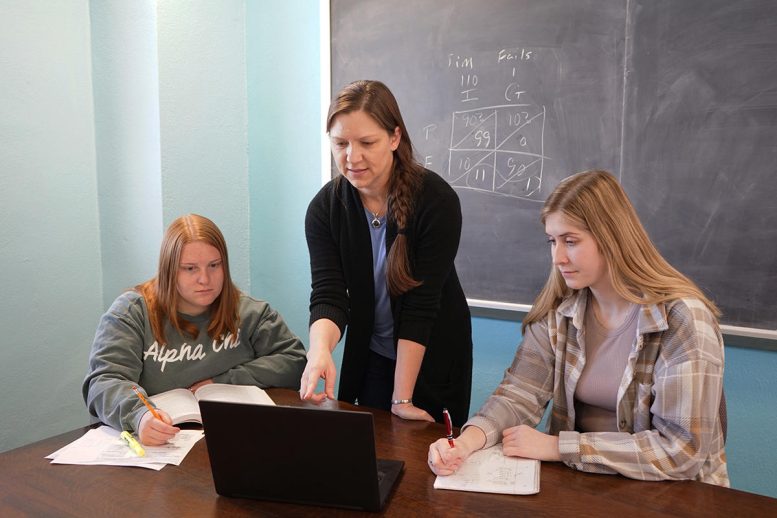
A New Study Demonstrates How Learning Can Slow Forgetting Down
According to Iowa State Psychology Professor Shana Carpenter, combining two strategies—spacing and retrieval practice—is the key to success, whether you’re attempting to pass an exam or take up a new pastime.
Carpenter is the lead author of a study that reviewed more than a century’s worth of learning research which was recently published in Nature Reviews Psychology.
“The benefits of spacing and retrieval practice have been confirmed over and over in studies in labs, classrooms, and workplaces, but the reason why we’re showcasing this research is because these two techniques haven’t fully caught on. If they were utilized all the time, we’d see drastic increases in learning,” said Carpenter.
Carpenter and her co-authors describe spacing as a method for learning in incremental amounts over time in their research. It’s the opposite of studying the night before a test. In one study, medical students who got repeated training in surgery over three weeks outperformed those who received the same training all at once in terms of performance on exams two weeks and a year later.

There isn’t a set rule on how much time should pass between practice sessions, according to Carpenter. However, research indicates that going over the information again after forgetting part of it (but not all) is beneficial.
Retrieval practice is an approach that involves remembering past learning. It can come in a variety of formats, such as flashcards, practice exams, and open-ended writing prompts, and it helps students in identifying their knowledge gaps. The authors of the article stress that those who check their responses for errors or get immediate feedback learn even better.
More than 200 studies show people generally retain more information for longer periods of time with retrieval practice compared to strategies that do not involve retrieval (e.g., re-reading a textbook.)
The authors argue people who combine spacing and retrieval practice have the best chance of remembering information.
“Forgetting is a very natural thing; you can’t stop forgetting even if you try, but you can slow down forgetting by using retrieval practice and spacing,” said Carpenter.
Highlighters and Illusions of Learning
Carpenter says false beliefs about learning are part of the reason retrieval practice and spacing aren’t used more widely.
“Probably the number one misconception is that learning has to feel easy in order to be working, and that’s just not true at all. You’ll learn more durably and more effectively if you persist and get through those challenges than if it had felt easy the whole time,” said Carpenter.
Simply highlighting or re-reading a textbook feels easier than writing responses to practice essay questions. But without the knowledge check that comes with trying to retrieve learned information, there’s a greater risk of being lulled into what the authors call an “illusion of learning.”
Carpenter acknowledges many people do not like making mistakes or realizing they don’t understand the material as well as they thought. It may dredge up insecurities, a fear of failing or some other emotion they want to avoid. But there’s a good chance they’ll eventually have to confront what they don’t know when the stakes are higher, like during an exam or presentation at work.
Bringing It Into the Classroom
Carpenter says she uses digital tools (e.g., online practice quizzes, and clicker questions) to incorporate retrieval practice and spacing into her university courses, but there are other ways to bring these strategies into the classroom.
She gives the example of an elementary school math teacher whose techniques were highlighted at a recent conference. A few days after a lesson on fractions, the teacher asked her students to share whatever they could remember about fractions. It was an open-ended and communal activity.
“The more they talked, the more they started to remember, and those kids were excited to talk about fractions,” said Carpenter.
She shares another story of a middle school teacher who routinely projects practice questions from previous lessons on a screen. The students jot down responses on note cards and then check their answers on their own or discuss them as a group.
Carpenter emphasizes the teachers in both examples did not grade the activities. Rather, they provided low- and no-stakes practice opportunities to help students learn and recognize mistakes as an important part of that process, which benefits students beyond the classroom.
“Learning how to learn is going to ensure that anywhere you go after the formal education years, you’re going to know how to learn something and be successful,” she said.
Reference: “The science of effective learning with spacing and retrieval practice” by Shana K. Carpenter, Steven C. Pan, and Andrew C. Butler, 2 August 2022, Nature Reviews Psychology.
DOI: 10.1038/s44159-022-00089-1
Never miss a breakthrough: Join the SciTechDaily newsletter.
2 Comments
Why does the conversation around forgetting always speak of it as though it were a problem? I suppose I know the answer, because people frequently forget what they’d like to remember, so it seems undesirable. Such is the disconnect between our perceived goals and our biological goals. It is a very valuable asset that you are able to forget. Thank goodness, our brain has a mechanism for cleaning up neural connections, formulating new memories and prioritizing that one’s that it calculates are most relevant to our present context. It’s a valuable tool, and asset, not a liability.
The best way to remove all problems from your body is distilled water. You help prevent dementia, cancer, any autoimmune disease, cancer, etc by just drinking distilled water.
This site gives an excellent example of why we need distilled water, and how it basically cures a ton of diseases and it doesn’t remove the minerals in your body which are latched to the cells. Only the inorganic minerals are removed, and you lead a healthier, happy life!
worldofwater. ca/doctors-say-drinking-distilled-water/
Just remove the space after the dot.